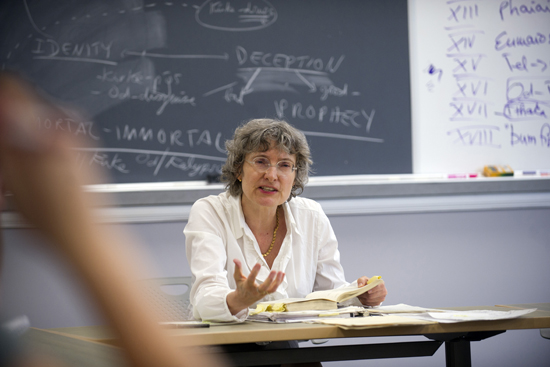Kilachand Honors College Will Follow Its Dream
Donation advances University’s newest college

Rosanna Warren loves teaching the Odyssey. BU’s Emma Ann MacLachlan Metcalf Professor of the Humanities says her University Honors College students were “in the grip of the poem.” Photos by Cydney Scott
On a recent afternoon, a dozen freshmen sit in a basement classroom at the Elie Wiesel Center for Judaic Studies, chatting excitedly about the Cyclops from Homer’s Odyssey as they await the arrival of their professor, celebrated poet Rosanna Warren, BU’s Emma Ann MacLachlan Metcalf Professor of the Humanities. Warren enters with a folder of papers, the first the students have written for this class, and issues a warning: “At the beginning, your grades are going to be low because you need motivation,” she says. “I don’t mean to really terrify you—only partially.”
Nervous laughter bubbles among the students, as Warren asks Jacob Brashear (COM’15) to summarize themes he culled from the day’s assigned readings. He coolly rattles off at least 10. The professor beams, then weaves Brashear’s themes into a word diagram on the blackboard. “That’s a superb set of observations and analysis to give us a good basis for discussion,” she says.
Warren says she loves teaching the Odyssey (an epic she’s read at least 50 times) and she believes that, like her, the students in her class were “in the grip of the poem.” It’s something that happens a lot, she says, because the students in her University Honors College class tend to be “extraordinarily motivated.”
Started just last year, the University Honors College, which welcomes the highest performing incoming freshmen, received some serious motivation yesterday in the form of a $25 million pledge from businessman and philanthropist Rajen Kilachand (GSM’74). The gift, from the chairman and president of the Dodsal Group, is the largest in the University’s history and will rename the college the Arvind and Chandan Nandlal Kilachand Honors College. It will provide the tools to expand enrollment in what director Charles Dellheim describes as “a new approach to liberal education” to 400 students by 2016. There are currently 137 students in the freshman and sophomore classes combined.
“This gift is a great endorsement of what we’re trying to do,” says Dellheim, a College of Arts & Sciences professor of history.

Kilachand Honors College has the feel of a small liberal arts college, while being embedded in a great research university. All the college’s students, who live in the same dorm their freshmen year, are enrolled in one of the University’s undergraduate schools and colleges, but take a quarter of their credits through the Kilachand Honors College. Classes are small, and designed to cultivate a deep intellectual exchange with some of the University’s most esteemed faculty.
“We believe that students of the arts and sciences need to know about the subject matter and perspectives of the professional schools,” says Dellheim. “A 21st-century liberal education should be not only about an understanding of texts, and of society, and of nature. Students also need to understand the dynamics of organizations, the workings of capitalism, and the emergence of new forms of arts, media, and technology.”
Freshmen in Kilachand Honors College take one seminar each semester, choosing from classes like War for the Greater Middle East, taught by Andrew Bacevich, a CAS professor of international relations, and Engineering Light, with Thomas Bifano, Photonics Center director and a School of Engineering professor of mechanical engineering. The classes are paired with a two-credit studio course that hones writing and research skills.
Sophomores take a two-semester course titled Insight and Innovation, which explores six fields in the arts, sciences, and professions. This year’s lineup includes the Large Hadron Collider, France during the Nazi occupation, and intellectual property, among others.
The junior seminar is intended primarily to prepare students for a senior keystone project, which they use to showcase how research, creation, and invention take place in their respective fields. Students studying engineering, communications, and business, for example, could team up to create a business pitch for a new concept in biomedical engineering.
Students attend regular cocurricular events—like a visit to the Boston Ballet for a rehearsal and discussion with production managers or a reading with National Book Award winner Ha Jin (GRS’94), a CAS professor of creative writing.
Kilachand Honors College students are an unusual bunch, and they know it. “We kind of have our own community within the larger BU community,” says Sarah Blair (CAS’14). “One thing that’s really notable about everyone is that they’re so passionate about what they like. And it’s really infectious.”
Comments & Discussion
Boston University moderates comments to facilitate an informed, substantive, civil conversation. Abusive, profane, self-promotional, misleading, incoherent or off-topic comments will be rejected. Moderators are staffed during regular business hours (EST) and can only accept comments written in English. Statistics or facts must include a citation or a link to the citation.